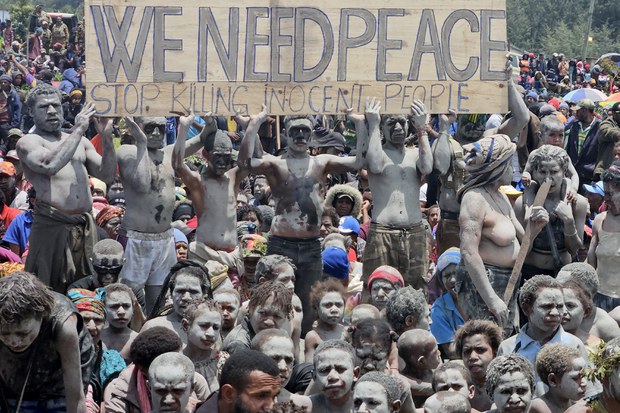Papua New Guinea security personnel shot six people – one fatally – and arrested dozens of illegal miners in an operation to crackdown on lawlessness in the country’s volatile highlands region, police said.
Authorities deployed additional officers and authorised the use of lethal force last month to quell fighting between illegal miners and landowners in the area surrounding the Porgera gold mine in Enga province.
Chairman of the Porgera Landowners Association James Ekepa told BenarNews on Monday that the mine had suspended operations indefinitely following violence that flared last week.
The shutdown was a result of fuel shortages caused by an illegal roadblock along the Highlands Highway near the site of a devastating landslide in Mulitaka, local media reported, citing a staff memo from the mine’s general manager, James McTiernan.
Police said armed men blocked the road with rocks and felled trees, then opened fire with high-powered automatic weapons on a convoy of four light vehicles and six 30-seater buses destined for the Porgera mine.
Officers escorting the convoy returned fire, killing one of the gunmen and injuring five, said Acting Assistant Commissioner of Police Joseph Tondop, who is overseeing emergency operations in Enga.
The 30 vehicles were successfully delivered to the mine, but a nearby helipad and two heavy vehicles were destroyed by the armed group, Tondop said.
Police Commissioner David Manning said 62 illegal miners were arrested following the attack.
“Our people and our country will not be held to ransom by criminals who use violence and fail to respect the rule of law,” Manning said in a statement Sunday night.
“Greed, pure and simple, is to blame for this most recent incident. As a result, one criminal was shot and killed, and a further five criminals have been seriously injured.”
The Porgera gold mine, an open pit and underground mine about 600km (372 miles) northwest of the capital Port Moresby, resumed operations on 22 December 2023 after its lease was suspended by the government in 2019.
The mine’s reopening under a new, partly foreign-owned venture New Porgera Limited resulted in a surge of illegal miners into a region that already struggles with law and order.
It’s unclear how many unauthorised miners are operating within the area, but conflict between the migrants and traditional landowners has been increasing, according to authorities.
Manning said the 62 arrested miners were “caught red-handed” attempting to steal gold bearing material from the mine.
He also identified a worrying trend of illegal miners sending children into blast areas to collect rocks.
“Let us be clear, these illegal miners are risking their lives, those of their children, and the lives of security personnel with their greed,” Manning said.
“Running into blast areas, thieving around explosives and falling rock faces to steal gold bearing material is madness.”
Porgera landowners have told BenarNews at least 30 people have died since the conflict erupted mid-August at the mine, describing open fighting between warlords in the mine pit and a lack of police presence.
Spasms of violence, often involving feuding tribes, are not uncommon in parts of PNG, the Pacific Islands’s most populous nation with an estimated 12 million people.
PNG could lose significant revenues if the mine does not resume production. Porgera contributes approximately 10 percent of the country’s total annual exports, according to the company website.
The IMF’s economic outlook for PNG in February said the country’s GDP would grow two points annually to 5 percent in 2024, “supported by production from the Porgera gold mine.”
PNG is endowed with significant mineral and other resources, but it has struggled to develop economically because of corruption, poor infrastructure and security problems.
In recent years, violent clashes in the remote and underdeveloped highlands have become more lethal due to an influx of modern automatic weapons.
PNG has one police officer for about every 1,800 people, nearly four times less than the level recommended by the United Nations to ensure law and order, according to a Griffith Asia Institute report released last year. The ratio of police to people has declined substantially in the past half century as PNG’s population tripled.














